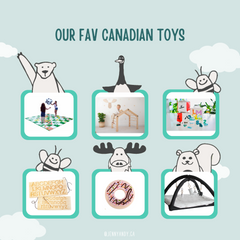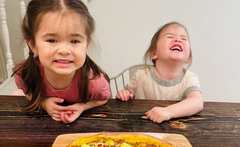
During this time, your toddler’s physical growth and motor development is still slowing down, but you’ll see huge growth intellectually, socially, and emotionally. His vocabulary will grow, and he’ll try to increase his independence from other members of his family.
This period may be emotionally challenging for both you and your toddler, especially when it seems like his new favourite word is “no”. He will be flip flopping between his reliance on you and his need to assert his independence, making it frustrating when he wants to cling to you when you try to leave him and when he runs the opposite direction when you want him to listen to you.
By acknowledging and accepting all the positives and negatives of these changes, you'll make it easier for both of you through the next few hectic years. Through the encouragement and respect you show him, your appreciation for his accomplishments, and the warmth and security you offer him, he'll learn to feel comfortable, capable, and special. This will help in later years as he goes to school and meets new people. Most important, they'll make him proud of and confident in himself as a person.
Keep in Mind
Keep in mind that the actual age when a typically developing child reaches a milestone really can vary. Each child develops in their own unique way, so there's no need to worry unnecessarily if your child isn't hitting a milestone right away, especially if your child is hitting most milestones in other domains.
That being said, you are your child's best advocate. If there is an issue, it's always best to act early, so if you have any concerns about your child's development, please speak with your pediatrician.
Social and Emotional Milestones

At age 2, your toddler may view the world almost exclusively through his own needs and desires. Because he can’t yet understand how others might feel in the same situation (also called theory of mind), he assumes that everyone thinks and feels as he does. On the occasions when he realizes he’s out of line, he may not be able to control themselves. Because of this, using statements like “How would you feel if she did that to you?” won't be effective and should be saved for when he's older.
Toddlers at this age understand and use the word "no" as a way to assert themselves. Sometimes, calmly redirecting your child or stating a request in a different way can help this behaviour. But a child can also stubbornly resist direction. Temper tantrums may often reflect related frustrations and competing feelings. It may sometimes be difficult to follow the ups and downs of your two-year-old. One moment, he’s smiling and laughing and the next he’s crying for no apparent reason. Often, these mood swings are just a part of growing up. They’re signs of emotional changes that are happening as your child struggles to take control of actions, impulses, feelings, and his body.
Two-year-olds are very interested and excited about being with other children. But they still engage largely in parallel play. They likely have not yet mastered sharing and other co-operation skills but may show emerging signs like handing things to others in play.
Many toddlers at this age:
- Spontaneously show affection for familiar playmates
- Show defiant behaviour and objects to major changes in routine
- Imitate others, especially adults and older children
- Play mainly beside other children (“parallel play”), but are beginning to include other children (i.e. chase games)
- Can take turns in games
Language & Communication Milestones

Your toddler will use at least 50 words and start putting two words together, like “dog sit” or “daddy up”. Over the course of this year, she’ll graduate from two- or three-word sentences (“eat toast”; “mommy come sit”) to those with four, give, or even six words!
Your toddler might also speak with a mix of made-up words and understandable words. It may seem like they speak a language that only parents and caregivers can understand at times! But at this age, your toddler’s language acquisition will be like a sponge. She’ll repeat words overheard from movies, the radio, and overheard adult conversations!
That being said, it’s important to avoid comparing your toddler’s verbal abilities with those of others her age. At this time, there’s more variation in language development than in any other area. Some toddlers develop language at a steady rate while others seem to master words in an uneven manner. And some toddlers are naturally more talkative than others. Remember: This doesn’t mean that the more verbal children are necessarily smarter or more advanced than the quieter ones. In fact, the quiet child may know just as many words but are choosier about speaking them.
Many toddlers at this age:
- Are able to understand and follow two- or three-step instructions (i.e. “go to your room and bring back the teddy bear and the dog”)
- Can recognize and identify almost all common objects and pictures
- Understand most simple sentences
- Understand physical relationships (i.e. “on”; “in”; “under”)
- Use four- and five-word sentences by the end of this period
- Can say their name, age, and sex
- Use pronouns (I, you, me, we, they) and some plurals (dogs, cars, cats)
Cognitive Milestones

In your child’s infancy, that was a time when he learned about the world by touching, looking, manipulating and listening. Now, as a two-year-old, the learning process is becoming much more thoughtful. His understanding of language is increasing and he’s starting to form mental images for things, actions, and concepts. He is also able to solve more problems in his head, performing mental trial-and-error rather than having to physically manipulate objects to solve problems. And as his memory and intellectual abilities develop more, he’ll start to have a better understanding of concepts like “You can play after you eat.”
Your two-year-old is also starting to understand the relationship between objects. He’ll be able to match similar shapes and objects and recognize the purpose of numbers in counting objects. His play skills are also becoming much more complex. For example, he’ll start stringing together different activities to create a logical sequence.
As you may begin to discover, reasoning with your two-year-old is often a major challenge. After all, he views everything in extremely simple terms. By the end of this period, he may often confuse fantasy with reality unless he’s actively playing make-believe. Therefore, be sure to choose your own words carefully, as comments that you think are funny or playful (“If you eat more cookies, you’ll explode”) may actually cause panic since he won’t know you’re joking.
Many toddlers at this age:
- Make mechanical toys work
- Can match an object to a picture in a book
- Play make-belief with dolls, animals, and people
- Sort objects by shape and colour
- Can complete inset puzzles with three or four pieces
Movement Milestones

Your toddler’s growth rate will slow between her second and third birthday but she will continue her remarkable physical transformation from baby to child. The most dramatic change will occur in her bodily proportions. As an infant, she probably had a relatively large head and short legs and arms. Now, with changes in rates of growth, her body and legs will look much more in proportion.
At this age, your child will seem to be continually on the go - running, kicking, climbing, and jumping. This can be tiring for you, but know that her activity level will strengthen her body and develop her coordination, so the more running and climbing your games involve, the better. Children at this age love piggyback rides, rolling on mats, going down slides, and climbing activities.
In the months ahead, your child’s running will become smoother and more coordinated and she’ll learn to kick and direct the motion of a ball, walk up and down steps by herself while holding on, and seat herself confidently in a child-size chair. With some assistance, she’ll even be able to stand on one leg.
Jenny & Andy’s Organic Plush Rattle Cubes are perfect for building both fine motor skills and gross motor skills. With a convenient handle, soft plush, and bell inside, it’s the perfect toy for grasping, shaking, throwing, rolling, and even kicking!
At age two, your child will be able to manipulate small objects easily, turn the pages of a book, build a tower of six blocks high, pull off her shoes, and unzip a large zipper. She’ll also improve her coordination of wrists, fingers, and palm so that she’ll be able to turn a doorknob, unscrew a jar lid, use a cup with one hand, and unwrap paper from a candy.
Many toddlers at this age:
- Scribble and draw simple strokes with a crayon
- Build a tower with 6 blocks
- Walk up and down stairs with alternating feet
- Are able to run and kick balls
- Bend over easily without falling
Sensory Milestones

As mentioned earlier, your two-year-old won’t be relying on using his senses as much to understand his world. But sensory play and sensory activities are still important learning tools throughout childhood.
When your child reaches age two, you’ll probably be eager to potty train him. But just remember: pushing him too early, before he is ready, may actually prolong the process. In order for a toddler to be successfully potty trained, he needs to be able to sense the urge to go, be able to understand what the feeling means, and then be able to communicate that he needs your help to make it to the toilet and actually go. Waiting until your child is truly ready will make the process much faster and more pleasant for everyone.
At age two, your child may sleep from nine to thirteen hours a day, and most children at this age still need to nap during the day. Your toddler will now be familiar with his bedtime routine, and if you change the routine, he may complain or have trouble going to sleep. But even without changes in routine, your toddler may still resist going to sleep and cry for you. Before bed, try giving your child a feeling of control by letting him make as many of the choices as possible at bedtime, for example choosing which pyjamas to wear or what book he wants to read.
Many toddlers at this age:
- May be ready to start toilet training
- May sleep nine to thirteen hours a day but may also resist going to sleep
Want a handy milestones checklist all in one place?
Download our Comprehensive Developmental Milestones Checklist PDF for free ☑️!
Developmental Milestones By Age
3 years (coming soon)
4 years (coming soon)
Sources:
- American Academy of Pediatrics. Caring for Your Baby and Young Child, 7th Edition: Birth to Age 5, Fifth Edition. 2009.
- Health Parents Health Children. Your Toddler's Growth and Development.
- Nemours Children's Health (2022). Your Child's Development: 1.5 Years (18 Months).




